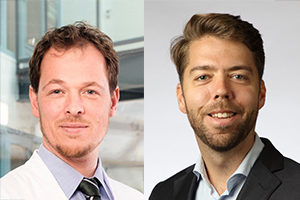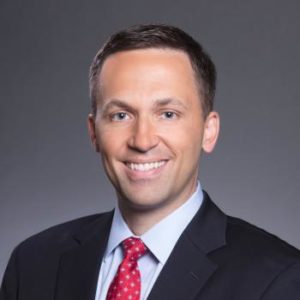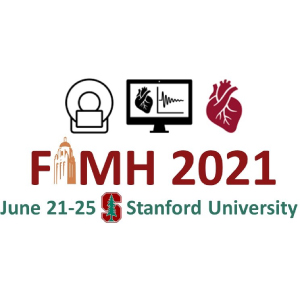
Ivana Isgum, PhD
University Professor AI & Medical Imaging
Amsterdam University Medical Centers
Department of Biomedical Engineering & Physics and
Department of Radiology & Nuclear Medicine
Amsterdam University Medical Center
Abstract:
Over the past decades, diagnostic imaging has become an integral part of modern medicine. Current increase in the number and volume of the acquired medical images has led to a tremendous increase in the expert workload for image interpretation. In recent years, deep learning has revolutionized many fields including medical imaging. It has shown potential to automate the routine analysis thereby alleviating expert workload, as well as to support clinical research. In this presentation, I will show our recent work on the development of AI-based methods to improve image quality, I will present methods we developed for quantitative analysis of CT and MRI exams, and illustrate their application in large-scale studies.

Radiology Department-Wide Research Meeting
• Research Announcements
• Koen Nieman, M.D., PhD – Coronary Artery Disease by Computed Tomography
• Martin Willemink, M.D., PhD – Translating Emerging Cardiovascular CT Techniques into the Clinical Setting
Location: Zoom – Details can be found here: https://radresearch.stanford.edu
Meetings will be the 3rd Friday of each month.
Hosted by: Daniel Ennis, PhD
Sponsored by: the the Department of Radiology

MIPS Seminar Series: Image-guided focal therapy for prostate cancer
Geoffrey Sonn, MD
Assistant Professor of Urology and, by courtesy, of Radiology (Molecular Imaging Program at Stanford)
Stanford University Medical Center
Location: Zoom
Webinar URL: https://stanford.zoom.us/s/96126703618
Dial: +1 650 724 9799 or +1 833 302 1536
Webinar ID: 961 2670 3618
Passcode: 186059
12:00pm – 12:45pm Seminar & Discussion
RSVP Here
ABSTRACT
In recent years, prostate cancer treatment has increasingly focused on selecting patients who are most likely to benefit and reducing harms from treatment. This has been seen both in adoption of active surveillance for men with low-risk prostate cancer and emergence of image-guided focal ablative therapy. While focal therapy causes fewer sexual and urinary side effects than conventional prostate cancer treatments, many questions remain about proper patient selection, treatment planning, and follow up care.
Improvements in prostate MRI performance and interpretation have paved the way for adoption of focal therapy. However, clinical challenges remain in prostate cancer imaging. This talk will describe prostate cancer focal therapy, discuss patient selection, and highlight the research efforts of my group to improve MRI interpretation to guide biopsy and improve focal therapy performance.
ABOUT
Geoffrey Sonn, MD is a urologic oncologist who specializes in treating patients with prostate and kidney cancer. He has a particular interest in cancer imaging, MRI-Ultrasound fusion targeted prostate biopsy, prostate cancer focal therapy, and robotic surgery for prostate and kidney cancer. He is the principal investigator of the first clinical trial in Northern California to use MRI-guided focused ultrasound to treat prostate cancer. The goal of this trial is to treat prostate cancer with fewer side effects than surgery or radiation.
Dr. Sonn was born in Washington State and lived there until leaving for college at Georgetown. After graduating magna cum laude at Georgetown he returned to the West Coast for medical school at UCLA. Following medical school, Dr. Sonn completed a 6-year urology residency at Stanford where he developed particular interests in the clinical care of patients with urologic cancers and research in cancer imaging. Dr. Sonn completed a 2-year urologic oncology fellowship at UCLA. Since completing his fellowship, Dr. Sonn has been at Stanford as an assistant professor in urology. Dr. Sonn’s research is devoted to developing new cancer imaging techniques, applying artificial intelligence to find cancers on medical images, and applying new methods to treat prostate cancer with fewer side effects.
Hosted by: Katherine Ferrara, PhD
Sponsored by: Molecular Imaging Program at Stanford & the Department of Radiology

Join us for a panel on Behavioral XR on Thursday, June 3rd from 9:00 – 10:30 am PDT. The event will start with a one-hour panel discussion featuring Dr. Elizabeth McMahon, a psychologist with a private practice in California; Sarah Hill of Healium, a company developing XR apps for mental fitness based in Missouri; Christian Angern of Sympatient, a company developing VR for anxiety therapy based in Germany; and Marguerite Manteau-Rao of Penumbra, a medical device company based in California. This panel will be moderated by Dr. Walter Greenleaf of Stanford’s Virtual Human Interaction Lab (VHIL) and Dr. Christoph Leuze of the Stanford Medical Mixed Reality (SMMR) program. Immediately following the panel discussion, you are also invited to a 30-minute interactive session with the panelists where questions and ideas can be explored in real time.
Register here to save your place now! After registering, you will receive a confirmation email containing information about joining the meeting.
Please visit this page to subscribe to our events mailing list.
Sponsored by Stanford Medical Mixed Reality (SMMR)

PHIND Seminar Series: Pervasive Computing With Everyday Devices To Build & Sustain Resilience & Wellbeing
Pablo E. Paredes, PhD
Clinical Assistant Professor, Psychiatry and Behavioral Sciences and, by courtesy, Epidemiology and Population Health
Stanford University
Zoom Webinar Details
Webinar URL: https://stanford.zoom.us/s/99098874758
Dial: US: +1 650 724 9799 or +1 833 302 1536 (Toll Free)
Webinar ID: 990 9887 4758
Passcode: 784858
11:00am – 12:00pm Seminar & Discussion
12:00pm – 12:15pm Reception
RSVP Here
ABSTRACT
As society progresses towards increasing pervasive computing levels, I design and build technology-enabled solutions to repurpose everyday devices to help people build resilience and grow wellbeing. I leverage biological and behavioral knowledge to design systems that balance user needs and health outcomes while mitigating surveillance and agency risks. In this talk, I present my research on efficacious and engaging sensors and interventions necessary in the population and public health domains. I share a series of research projects exploring and validating novel ideas on passive sensors – less dependent on subjective surveys or wearables – and subtle interventions that minimize workflow disruption. I show the promise of repurposing existing signals from computing peripherals (i.e., mouse and trackpad) or cars (steering wheel) into “sensorless” sensors and repurposing existing media as just-in-time micro-interventions that can work across multiple scenarios and populations. I discuss how these data could be used in collaboration with domain experts to study topics as varied as the interaction between stress and productivity in office workers, burnout prevention among clinical practitioners, or the prevention of depression among rural health workers. Finally, grounded in theories from neuroscience and behavioral economics, I propose the evolution of everyday “mundane” devices, such as chairs, desks, cars, or even urban lights, into adaptive and autonomous wellbeing-optimizing interventions. I close with a discussion of the research needed to systematically study ethics in pervasive technology for resilience, and wellbeing.
ABOUT
Pablo Paredes earned his Ph.D. in Computer Science from the University of California, Berkeley, in 2015 with Prof. John Canny. He is currently a Clinical Assistant Professor in the Psychiatry and Behavioral Sciences Department and the Epidemiology and Population Health Department (by courtesy) at the Stanford University School of Medicine. He leads the Pervasive Wellbeing Technology Lab, which houses a diverse group of students from multiple departments such as computer science, electrical engineering, mechanical engineering, anthropology, neuroscience, and linguistics. Before joining the School of Medicine, Dr. Paredes was a Postdoctoral Researcher in the Computer Science Department at Stanford University with Prof. James Landay. During his Ph.D. career, he held internships on behavior change and affective computing at Microsoft Research and Google. He has been an active associate editor for the Interactive, Mobile, Wireless, and Ubiquitous Technology Journal (IMWUT) and a reviewer and editor for multiple top CS and medical journals. Before 2010, he was a senior strategic manager with Intel in Sao Paulo, Brazil, a lead product manager with Telefonica in Quito, Ecuador, and an entrepreneur in his native Ecuador and, more recently, in the US. In these roles, he has had the opportunity to hire and closely evaluate designers, engineers, business people, and researchers in telecommunications and product development. During his academic career, Dr. Paredes has advised close to 40 mentees, including postdocs, Ph.D., master’s, and undergraduate students, collaborated with colleagues from multiple departments across engineering, medicine, and the humanities, and raised funding from NSF, NIH, and large multidisciplinary intramural research projects.
Hosted by: Garry Gold, M.D.
Sponsored by the PHIND Center and the Department of Radiology

Julia A. Schnabel, PhD
Chair in Computational Imaging
Head of Research & Impact
School of Biomedical Engineering & Imaging Sciences
King’s College London, UK
AI-Enabled Medical Imaging
Abstract:
Artificial intelligence, in particular from the class of machine learning and deep learning, has shown great promise for application in medical imaging. However, the success of AI-based techniques is limited by the availability and quality of the training data. A common approach is to train methods on well annotated and curated databases of high-quality image acquisitions, which then may fail on real patient cases in a hospital setting. Another problematic is the lack of sufficient numbers of clinical label annotations in the training data, or example for early markers of disease. In this talk I will present some of our recent approaches that aim to address some of these challenges, by using AI as an enabling technique for improved image reconstruction, realistic data augmentation and further downstream tasks. I will conclude by giving an outlook on the future opportunities in this field, operating right from the imaging sensor to extracting clinically relevant measures.

Join us for the 11th biennial International Conference on Functional Imaging and Modeling of the Heart (FIMH). FIMH-2021 will celebrate 20 years of bringing together friends, colleagues, and collaborators to share and discuss the latest in cardiac and cardiovascular imaging, electrophysiology, computational modeling, and translational applications. The event will take place June 21-25, 2021 virtually, via Livestream, Zoom meeting workshops, and Spatial Chat networking.
Sponsored by: Functional Imaging and Modeling of the Heart Conference

PHIND & CDH Seminar: “The Invisible Future of Health Monitoring”
Join Stanford CDH and PHIND on Wednesday, June 23rd at 3:15 PM PDT to hear some of the industry’s leading experts talk about embedded sensors, longitudinal data collection, the future of remote monitoring, and real-world applications of precision health technologies. The panel will feature: Nicolas Genain, MS, Withings; John O Moore MD, PhD, Fitbit Health Solutions at Google; Pablo Paredes, PhD, MBA, MS, Stanford University; and Michael Synder, PhD, Stanford University. The discussion will be moderated by Jun (Alex) Gao, MS, Samsung America.
Zoom Webinar Details
Webinar URL: https://stanford.zoom.us/s/96984014176
Dial: US: +1 650 724 9799 or +1 833 302 1536 (Toll Free)
Webinar ID: 969 8401 4176
Passcode: 375941
3:15pm – 4:15pm: Panel Discussion
RSVP Here
Sponsored by the PHIND Center and Center for Digital Health

Molecular Imaging in Neuroscience – MIPS Mini-Retreat
Hosted by: Dr. Michelle L. James, PhD
Sponsored by: Department of Radiology, Molecular Imaging Program at Stanford
The MIPS Mini-retreat series brings together members of the MIPS and greater School of Medicine community to discuss current opportunities for research and collaborations. During each mini-retreat we will discuss a different topic and we invite all those interested to attend. The mini-retreats are roughly two hours in length with ample time for discussion throughout. We hope you can join us and spark new collaborations!
Zoom Webinar Information
Webinar URL: https://stanford.zoom.us/j/92903233643
Dial: US: +1 650 724 9799 or +1 833 302 1536 (Toll Free)
Webinar ID: 929 0323 3643
Passcode: 146018
Tentative Agenda (all times are in PST)
8:00-8:05 AM – Opening Remarks – Michelle James, PhD
8:05-8:55 AM – Overview and Imaging-based Collaboration: Department of Neurology, Neurosurgery, Pathology, Psychiatry, and Nuclear Medicine (Frank M. Longo, MD, PhD, Michael Lim, MD, Thomas Montine, MD, PhD, Victor G. Carrión, MD, and Guido Davidzon, MD)
8:55-9:20 AM – Faculty Introductions: All interested MIPS faculty on the call give a 2-minute introduction including their interest in collaborating with Neurology, Pathology, Neurosurgery, and/or Psychiatry and Behavioral Sciences departments.
9:20-9:40 AM – Recent center proposals and possible mechanisms: UDALL Collaboration – Michelle James, PhD and Kathleen Poston, MD, MS
9:40-10:00 AM – Discussion – Moderated by: Michelle James, PhD and Katherine Ferrara, PhD

Radiology Department-Wide Research Meeting
• Research Announcements
• Mirabela Rusu, PhD – Learning MRI Signatures of Aggressive Prostate Cancer: Bridging the Gap between Digital Pathologists and Digital Radiologists
• Akshay Chaudhari, PhD – Data-Efficient Machine Learning for Medical Imaging
Location: Zoom – Details can be found here: https://radresearch.stanford.edu
Meetings will be the 3rd Friday of each month.
Hosted by: Kawin Setsompop, PhD
Sponsored by: the the Department of Radiology